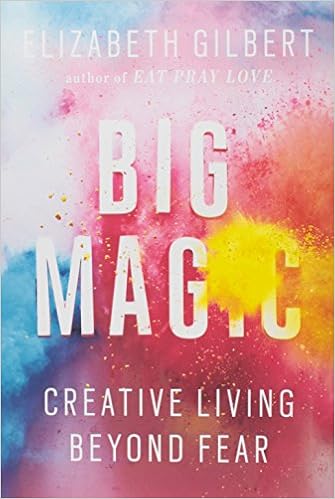 by Elizabeth Gilbert
by Elizabeth GilbertThere are many contradictions in this book and the typical marketing spin words, beginning with "magic" and sprinkled throughout the book - enchantment (see Sally Hogshead's book Fascination). Wizardy.
As someone who has spent half her life studying marketing (advertising), sociology, and philosophy, I'm able to recognize authentic authors who mean well, and authors that simply mean to "sell."
I think Gilbert actually means well, however, many of her messages are conflicting.
When we receiving conflicting advice, it slows us down, criss-crosses our thinking, ultimately erodes our confidence and character, and leaves us more fearful.
On one hand, she makes the point that your life and the outcome of your life is your responsibility.
She advises NOT to be the drama prone, excuse ridden, poor me, victim of life. Now, the irony here is that she is good friends with Berne Brown, who has spent her life make excuses, in therapy (yet she makes millions selling self help books), and profiting off of portraying herself as an angst ridden victim of anxiety.
Then Gilbert says that, basically, you don't have control of your life, there is something bigger out there and if it's meant to be, it will be.
Gilbert tells wonderful stories of her parents and how creative and self sufficiency - but then she makes a jab that they are republicans and voted for Reagan (twice!) - implying that though her parents are wonderful, they aren't very smart when it comes to politics.
There are more veiled jabs at conservatives yet and our military, much of what she suggests in the book is the very principles of conservatives: Independence, Self Reliance, Respecting your body (don't let drinking/drugs/unhealthy relationships get in the way of your art). Work - don't become dependent.
The only difference is, many conservatives believe in God, and Gilbert believes in magic.
Another Irony: in one chapter she says fear is "not smart."
Then in the next chapter, she says you need fear to stop you from running into the middle of a busy street.
She says put your ego aside, yet, she also encourages the reader to be an individual. This is where most of the 'self help' advice is contradictatory and leaves many broken readers who try to abide by this advice.
If we didn't have an ego, we would not feel the need to create. We would not feel the need to shower, to try to live healthy, to not live in our pajamas every single day.
It is healthy to have an ego. If Gilbert didn't have an ego, she would publish under a pen name and refuse to do any interviews.
She advises readers it's better to be a 'trickster' than to be honorable.
And this is the reason for my one star.
If you've ever been lied to or cheated on, you know how damaging distrust can be.
We can't survive and thrive as a society if we can't trust people. You can still strive to be an honorable person and still not take life so seriously. Still 'roll' with the punches.
I LOVE that Gilbert says you do not need to attend college in order to be successful (which is very opposite the liberal narrative). Also, here's yet another contradiction because she praises Berne Brown who identifies herself as a "scholar" - has lived in insulated life, yet has extreme trouble coping with normal every-day tension.
(If you're told enough times that you're broken, eventually, you will believe it).
I LOVE that Gilbert says you can practice your art your entire life, and that a true artist, even if never receiving accolades, will realize the value and joy in simply practicing your gift.
But there are just too many contradictions in this book, and encouraging people to be slippery and shady and also blind to other slippery and shady will erode your confidence and self worth.
This book is mostly about suggestions to encourage you to believe in yourself, very little about "creative" living
If you're looking for a great book about "living beyond fear", try this old book: Outwitting the Devil by Napoleon Hill. It's definitely a "creative" work, but has very timeless, classic, and true advice.
Try James Allen, "As A Man Thinketh"
Or try Viktor Frankl's "Man's Search For Meaning."
Liberal Influence Scale: 5


No comments:
Post a Comment